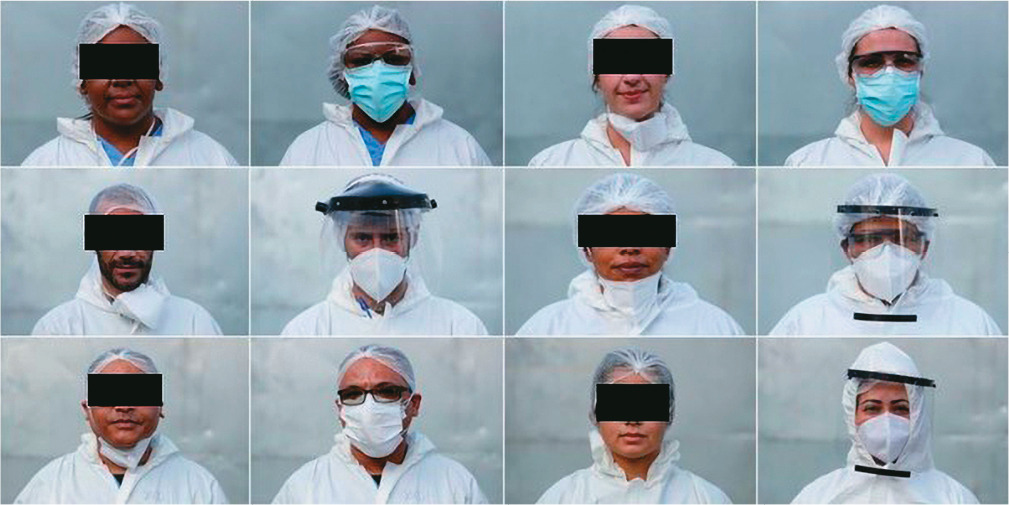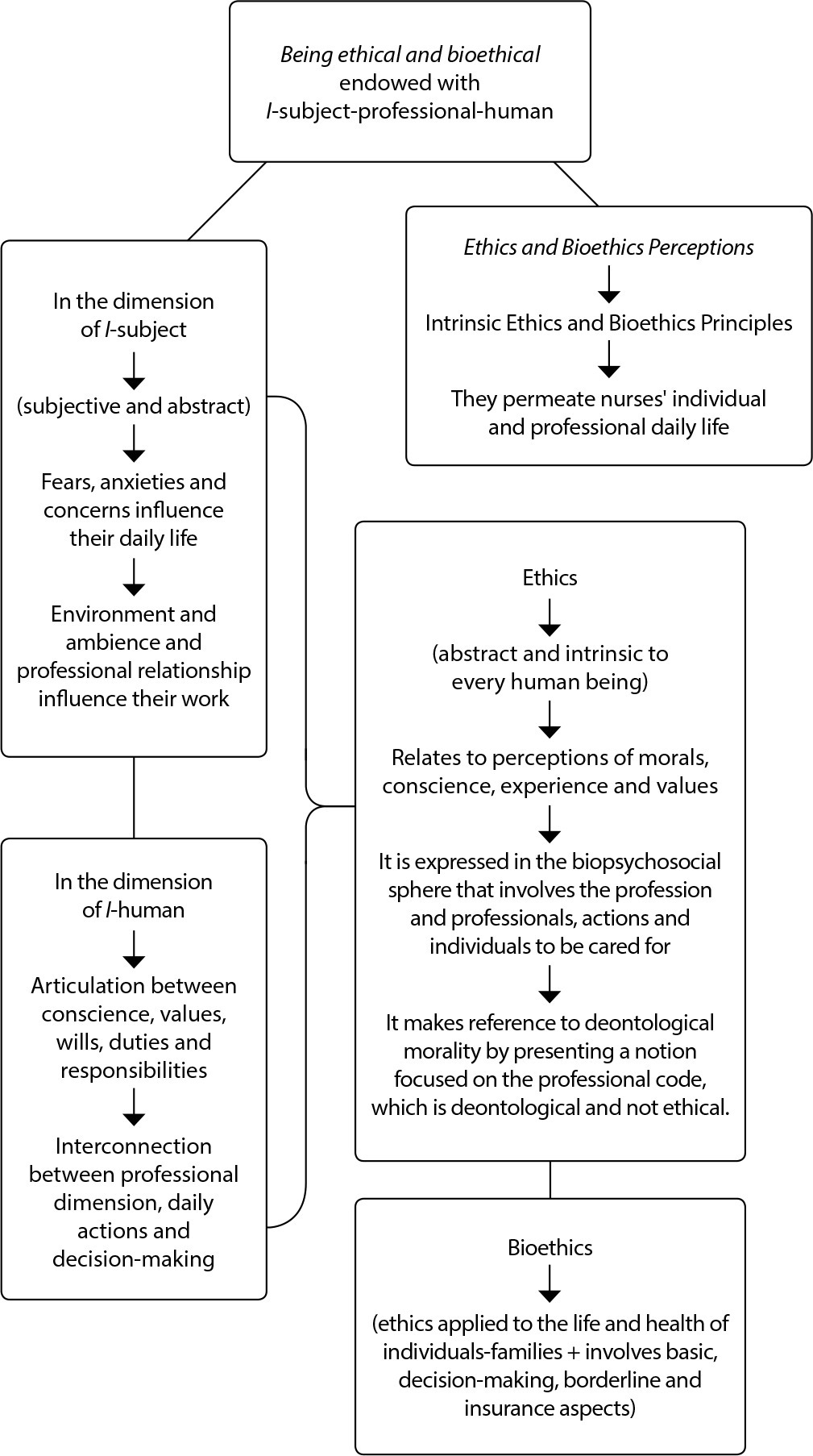-
TECHNOLOGICAL INNOVATION
Nursing rights in comics: educational technological innovation report
Revista Brasileira de Enfermagem. 2024;77(Suppl 4):e20230438
03-18-2024
Resumo
TECHNOLOGICAL INNOVATIONNursing rights in comics: educational technological innovation report
Revista Brasileira de Enfermagem. 2024;77(Suppl 4):e20230438
03-18-2024DOI 10.1590/0034-7167-2023-0438
Visualizações0ABSTRACT
Objectives:
to report an educational technology construction on nursing professionals’ rights.
Methods:
an experience report on educational technology construction during the crediting of university extension hours in an undergraduate nursing course at a Brazilian public university, between March and June 2023. The Deming cycle was used as a procedural method.
Results:
four meetings were held between students and extension workers. Eight comic books were produced based on the Code of Ethics for Nurses, addressing professional autonomy, fair remuneration, risk-free work, denial of exposure in the media and others. The Deming cycle proved to be an important strategy for constructing products.
Conclusions:
nursing professionals’ rights must be discussed and improved. Educational technologies, such as comic books, provide playful and reflective learning.
Palavras-chave: Education, NursingEthics, NursingGraphic NovelNursingTechnological Development and Innovation ProjectsVer mais
-
ORIGINAL ARTICLE
Overview of nursing ethics teaching in Brazilian public higher education institutions
Revista Brasileira de Enfermagem. 2023;76(Suppl 3):e20220808
12-04-2023
Resumo
ORIGINAL ARTICLEOverview of nursing ethics teaching in Brazilian public higher education institutions
Revista Brasileira de Enfermagem. 2023;76(Suppl 3):e20220808
12-04-2023DOI 10.1590/0034-7167-2022-0808
Visualizações0Ver maisABSTRACT
Objectives:
to outline the teaching of ethics in undergraduate Nursing programs in Brazilian public higher education institutions.
Methods:
descriptive and exploratory study, carried out through the documentary analysis of pedagogical projects of undergraduate Nursing programs in Brazil.
Results:
153 active undergraduate Nursing programs were found, of which 106 provide the pedagogical project. In addition to deontological teaching, the teaching of ethics was identified in a transversal way associated with themes such as Social Context, Hospital and Community Care, Pharmacology, Systematization of Nursing Care, Surgical Nursing, Epidemiology, Palliative Care, Management in Nursing, Diversity, Women’s, Children’s, Adolescent’s, Adult’s and Older People’s Health, and Mental Health.
Final Considerations:
the challenge in teaching nursing ethics is its integration with each action of caring, teaching and managing.

-
REVIEW
Supervision of professional nursing practice in Brazil: a scoping review
Revista Brasileira de Enfermagem. 2023;76(Suppl 3):e20230077
12-04-2023
Resumo
REVIEWSupervision of professional nursing practice in Brazil: a scoping review
Revista Brasileira de Enfermagem. 2023;76(Suppl 3):e20230077
12-04-2023DOI 10.1590/0034-7167-2023-0077
Visualizações0Ver maisABSTRACT
Objectives:
to map studies that analyze the audit process of nursing councils.
Methods:
this is a scoping review, anchored in the JBI framework, with the guiding question: what is the evidence of the audit process of legal practice of nursing by class councils (COFEN/COREN system)? The searches were carried out in October and November 2022 without limitation of language and year.
Results:
of the 9 selected studies, all are Brazilian and published from 2014 onwards. Among the topics addressed are the role, challenges, costs and difficulties in nurse auditors’ daily work process, in addition to the contribution of the audit sector in Brazil.
Conclusions:
the studies gathered discuss aspects related to costs, challenges and difficulties, but there is no focus on corrective, disciplinary and educational activities as well as little is said about the audit process, its reporting, referral and outcomes.

-
ORIGINAL ARTICLE
Ethics, COVID-19 and nursing vulnerability: analysis of photographs released by the media
Revista Brasileira de Enfermagem. 2022;75(Suppl 2):e20210960
10-17-2022
Resumo
ORIGINAL ARTICLEEthics, COVID-19 and nursing vulnerability: analysis of photographs released by the media
Revista Brasileira de Enfermagem. 2022;75(Suppl 2):e20210960
10-17-2022DOI 10.1590/0034-7167-2021-0960
Visualizações0Ver maisABSTRACT
Objectives:
to analyze nursing vulnerability through photos released by the media amidst the COVID-19 pandemic.
Methods:
a documentary study, with a qualitative approach. The object of analysis were photographic images selected between January 2020 and March 2021, published by the main news portals in countries such as Brazil, the United States, France, Spain, England and Germany. Thematic categorical analysis was the method of analysis used.
Results:
we found 74 photographs that portrayed nursing professionals in different work situations. It was possible to identify stigma and social devaluation about this class’s representation and professional attribution. Moreover, we found an underrepresentation of black professionals in Brazilian portals and the man as the prominent figure in the spaces of claims.
Final Considerations:
the photographs represented an important tool for the social analysis of nursing vulnerability, favoring the unveiling of situations that may go unnoticed by nursing and society.

-
ORIGINAL ARTICLE
Being ethical and bioethical in daily life of primary health care: nurses’ perceptions
Revista Brasileira de Enfermagem. 2022;75(3):e20210093
10-18-2022
Resumo
ORIGINAL ARTICLEBeing ethical and bioethical in daily life of primary health care: nurses’ perceptions
Revista Brasileira de Enfermagem. 2022;75(3):e20210093
10-18-2022DOI 10.1590/0034-7167-2021-0093
Visualizações0Ver maisABSTRACT
Objectives:
to understand the perceptions of ethics and bioethics and how to be ethical and bioethical in daily life of Primary Health Care, from the perspective of nurses.
Methods:
this is a Holistic-qualitative Multiple Case Study, based on Comprehensive Everyday Sociology, with 54 participants.
Results:
two subcategories and the category Being ethical and bioethical in daily life of PHC: nurses’ perceptions emerged. The ethical and bioethical being permeates a subjective and abstract self, whose fears, anxieties and concerns are intertwined with the human and professional dimensions in daily work and in personal-professional relationship. Ethics and bioethics perceptions emerge from subjectivity, established relationships, lived experiences and daily actions of nurses essential to the profession, professionals and individuals to be cared for.
Final Considerations:
ethical and bioethical perceptions and attitudes are essential to care, management and organizational actions, health care, and the safety of users and professionals.




